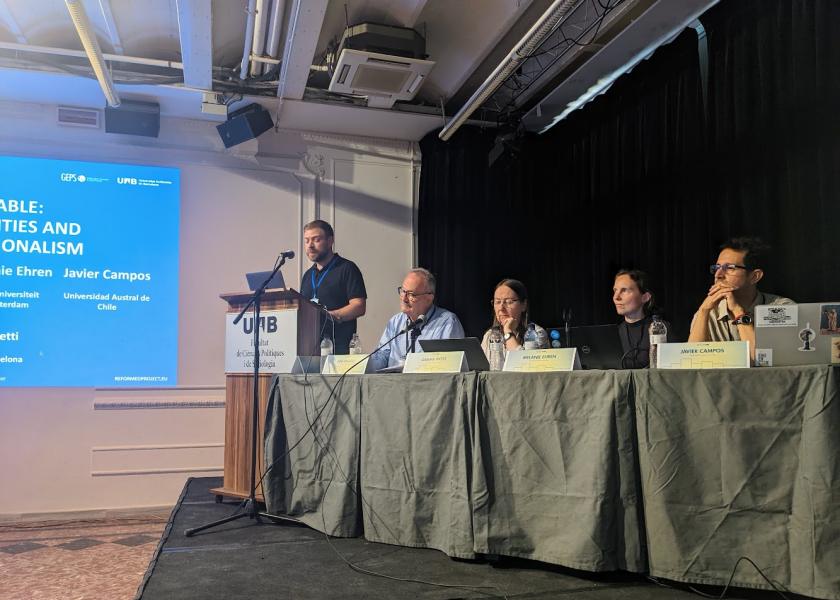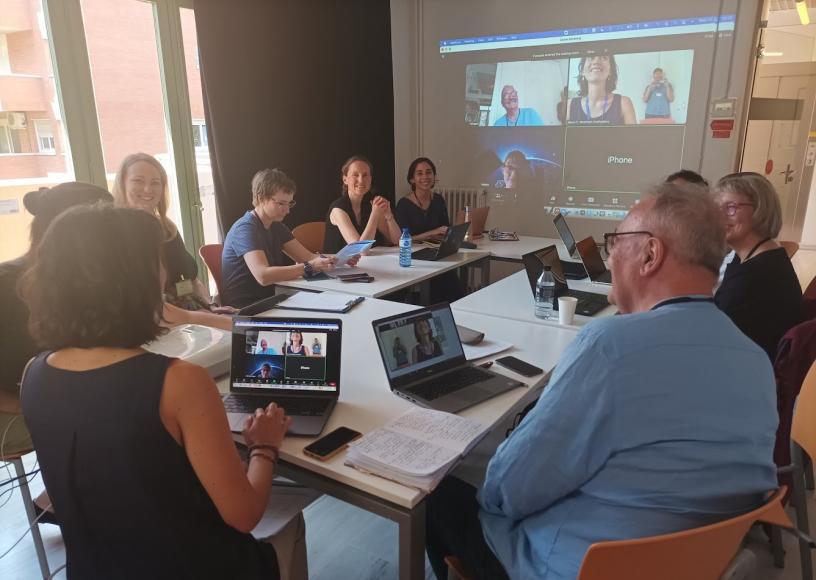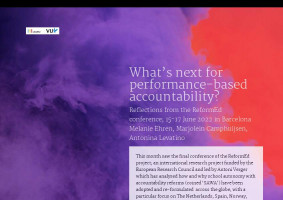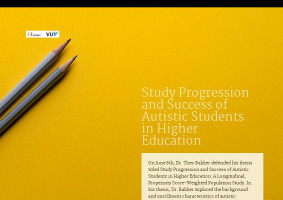This month saw the final conference of the ReformEd project; an international research project funded by the European Research Council and led by Antoni Verger which has analysed how and why school autonomy with accountability reforms (coined ‘SAWA’) have been adopted and re-formulated across the globe, with a particular focus on The Netherlands, Spain, Norway, Chile, Mexico and Brazil. Verger’s team has looked at the institutional frameworks and policy enactment processes that explain the effects of these reforms on schools and how variations between countries can be understood from the different traditions of educational governance in the participating countries.
LEARN! colleague Marjolein Camphuijsen was part of the team to study the Norwegian system, while Melanie Ehren has contributed to the study in the Netherlands. Antonina Levatino, who is currently a visiting scholar at LEARN!, designed and coordinated the ReformEd survey, which was administrated in five countries (Brazil, Chile, Norway, Spain, and the Netherlands). All three contributed to the conference and summarize some of their reflections from the keynote speeches and some of the exchanges in thematic networks in this blog.
Opening ceremony with Gita Steiner-Khamsi (Columbia University), Xavier Bonal (UAB) & Antoni Verger (UAB) and keynote by Verger
In the opening ceremony, Gita Steiner-Khamsi from Columbia University (US) complimented the team with the extensive work of mapping the introduction and strengthening of SAWA reforms across the globe. She referred to Verger’s graph which has become one of the most cited recent works and which indicates how a growing number of OECD-countries is adopting one or more standardized assessments, which are increasingly often used for monitoring, evaluation and accountability purposes. Verger and colleagues show that national large-scale assessments play a key role in integrating the policy principles of school autonomy, performance-based accountability policies and learning standards into a coherent reform approach, which is increasingly often adopted by a wide range of countries around the globe to improve the performance and equity of school systems (Verger et al. 2019).
Verger explained the explosion of the SAWA agenda by referring to wider New Public Management agenda’s which fit with SAWA policies, how SAWA reforms align with a wider focus on effectiveness and learning (informed by international assessments and learning metrics as a proxy for education quality), the convenience of an effectiveness agenda for parties across the political spectrum, and the fact that SAWA policies can easily be adopted to specific national reform agenda’s. SAWA-policies have a strong symbolic power to many constituencies and be incorporated or fit into many other agendas for educational change.
The powerful narrative of the SAWA-agenda for delivering more effective and efficient education makes it a difficult one to resist or disagree with, despite the various unintended consequences that have emerged over the years. The wide uptake of SAWA can also be understood by international organisations pushing this agenda, such as the World Bank’s ‘Systems Approach for Better Education Results (SABER), or the OECD’s reports.

Gita Steiner-Khamsi warned that the up-take of SAWA-policies globally has not yet reached a saturation point as there are many more countries that are implementing these policies. Steiner-Khamsi further reflected on the contribution of Verger’s team in allowing for a more theory-driven contribution to comparative research. She explained that the field of comparative education research is currently dominated by two major bodies of work: 1) portraying and analysing pathways and trends in the adoption of test-based and standard-based, and 2) using case studies to understand the points of change in these pathways and trends (e.g. the ‘dots’ on Verger’s curve where trend lines see a sharp increase). These case studies –which could also include the introduction of policies in specific countries- help us understand why reforms take hold in a country, how policies are translated across contexts and the specific effects they have in various contexts.
Patrick Le Galès’ (from Sciences Po) contribution emphasized the need for such ‘deep dive’ studies in referring to the ‘probabilities of policies’ where goals often emerge during policy implementation (instead of being articulated upfront, or being implemented as intended) and where outcomes also vary for different groups and contexts. Researchers need to look at these varying outcomes, building on critical realist approaches to evaluation to make comparative research more theory-driven, rather than just comparing systems and describing differences.
In this presentation, Toni Verger started by a comparison of OECD countries in the introduction of SAWA policies, but used it to explain how existing administrative traditions (among other contextual factors) shape the reformulation and implementation of these policies. Verger distinguished countries as NPM marketizers (Anglo-American countries, Chile), Napoleonic (Southern Europe) and Neo-Weberian (Nordic countries). These three administrative contexts have implications for the introduction of SAWA policies as these are fitted into existing traditions and have to fit within existing policy instruments and frameworks (Verger et al., 2019):
- In countries with a marketized tradition, global education reforms have been adopted within a market-oriented rationale, involving the active participation of the private sector and elements of competition between providers. There, high- stakes performance-based accountability intersects with free school choice, where test scores and league tables are used by parents to select a school and this creates competition within the system.
- In countries with a Napoleonic tradition, global education reforms have been adopted with the declared aim to modernize public service and administration and make educational systems more flexible. There, performance-based accountability is much lower stakes. In these countries, teachers and schools tend to resist the emphasis on testing (e.g. by teacher unions), and tests are viewed as a means to control teachers and a source of increased bureaucracy and work load as scores have to be reported to the state, but tend not to get used for school improvement.
- In countries with a Neo-Weberian tradition, global education reforms have transformed teachers' work but do not seem to have challenged the very idea of public service professionalism. There, performance-based accountability has been adopted with the explicit goal of assuring quality and as a way to promote transparency to facilitate citizens´ engagement and deliberation.

The introduction of SAWA also leads to different responses in schools, depending on their goals, context, school culture, organisation, composition and the performance of their students as well as the school’s position in the local education market; Gerard Ferrer-Esteban talked about five types of responses: 1) appropriation, 2) accommodation, 3) dilution, 4) decoupling and 5) de facto opting out. Appropriation is characterized by significant efforts to incorporate the accountability mandate not only into instructional strategies, but also into the schools’ broader pedagogic and management approaches. Accommodation includes schools that are aligned with a performative culture and more smoothly accommodate to performance-based accountability regulations. These schools are characterized by a continuous improvement culture and aim at improving their scores year by year. Nonetheless, their improvement plans are holistic and integrate dimensions which go beyond learning outcomes. Dilution occurs in schools that do not wholly engage with the metrics derived from the national standardized test, and that do not put academic performance at the center of their educational project. Decoupling is characterized by the adoption of practices and strategies to improve their scores and overcome accountability pressures in a way that does not alter substantively their educational values and approach. Finally, de facto opting-out is a reaction of apathy in front of a performance-based accountability that makes some schools operating in highly vulnerable contexts feel powerless and resigned. This response is thus characterized by nonaction and passivity in front of external pressures (see also Verger et al. 2020)
In their work, Ferrer-Esteban and ReformEd colleagues have highlighted how the schools’ socio-economic contexts and objective levels of administrative pressure are important mediating variables in understanding the nature of schools’ responses to accountability, while they simultaneously emphasize that such factors interact with variables of a more subjective nature in the production of a wider and more complex range of responses to accountability. In particular they show how school actors’ policy interpretation, their experienced levels of pressure, and their performative organizational culture, influence the variegated forms of school responses to the accountability regulatory system.
This converged with a final reflection by Gita Steiner-Khamsi who argued for taking the school as a level of analysis (rather than a country or nation state), given the large variation in enactment of these policies across schools and the argument by Le Galès that education systems do not even fit within the domain of the nation state given the increasing dominance of education policymakers on the global scale.
In addition to attending the key note speeches, conference participants were part of a thematic network, in the context of which workshops were organized each day. During these workshops, network members discussed academic working papers on SAWA reforms in smaller groups. The thematic networks were focused on (1) policy trajectories; (2) enactment and markets; (3) reactivity and responses; (4) professional autonomy; and (5) actors in policy trajectories.
Marjolein and Antonina coordinated network 3, which addressed the varied school responses that have been documented following the introduction of global education reforms, and how to explain this variation. A recurrent question in this network related to what schools are for and several papers documented a tension experienced by school actors between a moral responsibility towards society and the local community and an accountability system focused on a narrow-set of learning goals. Moreover, the papers in the network highlighted the need to move beyond the dichotomy of high- and low-stakes accountability, and in particular to critically scrutinize the use of this dichotomy as a core explanatory factor for differences in performative pressure and the emergence of side-effects. This is particularly relevant considering that evidence is piling up that significant pressure to perform and undesired effects, such as teaching to the test and curriculum narrowing, are not exclusive to high-stakes contexts. Moreover, this is also relevant from a policy perspective, considering that policymakers in countries such as Germany (see for example Thiel et al., 2017) actively attempted to prevent the emergence of side-effects not attaching high-stake consequences to accountability demands, to then still see these side-effects occur. As a way to explain this, discussions in the network paid particular attention to the powerful impact of performance metrics in shaping our thinking of who we are and what we aspire to be, even in the absence of material consequences.
The conference ended with a presentation by Lluis Parcerisa and Antonina Levatino, in which they explained that the data collected in the context of the ReformEd project will be made available to external researchers, as the data will be published in an open access format next Autumn. This includes qualitative data which was collected in the context of the project’s first research strand (focused on understanding the dissemination of SAWA policies) and quantitative and qualitative data collected as part of the project’s second research strand (focused on the enactment of SAWA policies in different contexts). More information will soon be made available on the ReformEd website: www.reformedproject.eu.

prof.dr. Melanie Ehren
Professor in Educational Governance
Director of Research Institute LEARN!
Vrije Universiteit Amsterdam
Honorary Professor
University College London
DR. Marjolein Camphuijsen
Assistant Professor, LEARN! - Educational governance, identity and diversity
DR. ANTONINA LEVATINO
Research Fellow at the Department of Sociology of the UAB















